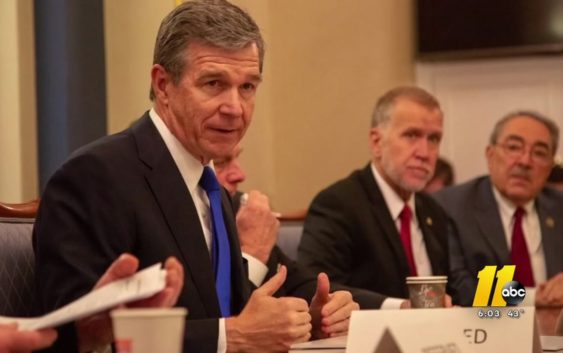- $40 million to go to underserved SC counties for Hurricane Helene recovery. Here's what you need to know.
- Family honors Air Force veteran Derwin Anderson Jr. after he died in June flash floods
- City of Wilmington addresses flooding on New Centre Drive
- Harnett County fire: Two homes damaged
- Medical examiner identifies 13th victim from massive flash flood in San Antonio
In DC, Gov. Cooper pitches Congress, Trump administration on hurricane relief

WASHINGTON, D.C. (WTVD) —
North Carolina Gov. Roy Cooper visited the nation’s capital on Wednesday to rally support for significant federal assistance for recovery from Hurricane Florence.
In meetings at the Capitol and the White House, Cooper touted North Carolina’s own investment in relief efforts to shore up backing for an additional $5 billion.
“When you’re talking about a $17 billion loss from this storm, we know we’re going to need help from all kinds of places,” Cooper told ABC11, referencing officials’ official estimate of the total cost of hurricane-related damages. “It is time for state government, federal government to step up and do what’s right by our state to make sure we can get back on our feet and start rebuilding stronger and smarter.”
The day started with Cooper meeting with most members of the Tar Heel State’s congressional delegation, including Sen. Richard Burr (R) and Sen. Thom Tillis (R). Also in attendance, 10 of North Carolina’s 13 members of the House of Representatives, including Rep. G.K. Butterfield (D), Rep. George Holding (R), Rep. David Price (D), Rep. Virginia Foxx (R), Rep. Mark Walker (R), Rep. David Rouzer (R), Rep. Richard Hudson (R), Rep. Robert Pittenger (R), Rep. Patrick McHenry (R) and Rep. Alma Adams (D). The three other congressmen, Rep. Mark Meadows (R), Rep. Ted Bud (R), and Rep. Walter Jones (R) could not attend.
“There has been remarkable bipartisan cooperation and effort,” Cooper said. “Resiliency and lessening the impact of future storms is going to be a hallmark of this recovery effort that we are undertaking here.”
In his interview with ABC11, Cooper identified three key areas for federal aid: housing, agriculture, and infrastructure. He said he hoped lawmakers can approve the aid as part of a larger appropriations bill on the agenda for this month’s lame-duck session.
Rep. David Price (D), who will become chairman of an appropriations subcommittee next year, was confident that there will be bipartisan support for North Carolina’s requests.
“Most of us, most of the time, have that solidarity and we’ve helped with disasters all over the place and we count on our colleagues now,” he said.
Asked about the other emerging requests for disaster relief in California and how that might affect North Carolina, Price dismissed any concern that the Tar Heel State would no longer be a priority.
“We want the country at full strength, and when Florida panhandle is devastated, when North and South Carolina have untold amounts of damage, when fires ravage California – these are national disasters. They’re national scale disasters.”
Tillis, whose Republican Party will maintain a majority next year in the Senate, agreed.
“Capitol Hill understands that North Carolina has experienced three 500-year events in the last 18-19 years,” Tillis said, including Hurricane Floyd in 1999. “There’s a huge case for our being prepared for the next storm. This is when Congress is at its best when we’re working. We have resource limitations, but we get together to make sure priority goes to those states that are in need.”
After his meeting on Capitol Hill, Cooper met at the White House with two members of President Donald Trump’s administration: Housing and Urban Development (HUD) Secretary Ben Carson, and White House Homeland Security Advisor Rear Admiral Doug Fears.
A spokesman for Cooper said the meetings echoed a number of themes from Capitol Hill, including pushing Secretary Carson and top HUD officials for maximum flexibility in how Community Development Block Grant- Disaster Relief (CDBG-DR) funds can be spent. Regarding Homeland Security, the Governor re-emphasized his desire for stronger regulations on rebuilding so that housing and infrastructure can better withstand future storms.
(Copyright ©2018 WTVD-TV. All Rights Reserved.)